Temporary Residence
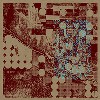 What was once a side-project of Tarentel bandmates has now fortunately matured into a fully-realized band. The Drift play a moody, contemplative, and sometimes ecstatic mixture of jazz and post-rock which is not too difficult to connect back to the current Tarentel sound, even though there is only one shared member at this point. The ensemble features of an accord of stand-up bass, guitar, drums, and trumpet, all sharing space to make some well-choreographed sounds. The two songs on this exquisitely-packaged 12" are teasers from The Drift's recording sessions for their full-length and the promise exhibited in them is exhilarating. "Streets" is a ten-minute explorative piece which has a few movements to it. It begins with what is literally a drifty oceanic sound shattered eventually by the prodding but not unwelcome entrance of the stand-up bass, poking its plucked strings through the haze. A light percussion gives it some feet until the instruments collaboratively all rush in with a swing-happy trumpet signaling the charge. The pleasantries of the song lie in the ability of all the instruments to be playing singularly and separately, doing their own thing, yet somehow melding into some organic mass of melody and rhythm which keeps the song running, jogging, or sprinting (the song phases through all of these paces amazingly well during its movements). Throughout the song, the instruments seem entirely able to step on one another's toes elegantly, if such a thing were possible. There is no disturbance in the dance, even when one instrument decides to muscle its way in and seemingly ask, "May I cut in?" The bass is the true conveyor for "Streets," while the other instruments step up for flings and flirtations, sometimes brief and other times extended. In the end, the circularity of the song brings it back to its beginnings (in true East Coker fashion) and the drifty sound transports it away on some deliberate ebb tide. "Nozomi" enters with relaxing guitar steps underwritten with a light wails from the trumpet. It's like walking up and down the same three graceful steps over and over. The tempo of "Nozomi" is uniformly slow and meditative, unlike "Streets" where there was acceleration paired with deceleration throughout. In fact, "Nozomi" feels entirely more holistic and showcases the more restrained capabilities of The Drift. They can improvise on a hushed level or an explosive level or on both combined. Likewise, this record can be enjoyed in either a hushed or explosive state, but it's better to embrace both.
What was once a side-project of Tarentel bandmates has now fortunately matured into a fully-realized band. The Drift play a moody, contemplative, and sometimes ecstatic mixture of jazz and post-rock which is not too difficult to connect back to the current Tarentel sound, even though there is only one shared member at this point. The ensemble features of an accord of stand-up bass, guitar, drums, and trumpet, all sharing space to make some well-choreographed sounds. The two songs on this exquisitely-packaged 12" are teasers from The Drift's recording sessions for their full-length and the promise exhibited in them is exhilarating. "Streets" is a ten-minute explorative piece which has a few movements to it. It begins with what is literally a drifty oceanic sound shattered eventually by the prodding but not unwelcome entrance of the stand-up bass, poking its plucked strings through the haze. A light percussion gives it some feet until the instruments collaboratively all rush in with a swing-happy trumpet signaling the charge. The pleasantries of the song lie in the ability of all the instruments to be playing singularly and separately, doing their own thing, yet somehow melding into some organic mass of melody and rhythm which keeps the song running, jogging, or sprinting (the song phases through all of these paces amazingly well during its movements). Throughout the song, the instruments seem entirely able to step on one another's toes elegantly, if such a thing were possible. There is no disturbance in the dance, even when one instrument decides to muscle its way in and seemingly ask, "May I cut in?" The bass is the true conveyor for "Streets," while the other instruments step up for flings and flirtations, sometimes brief and other times extended. In the end, the circularity of the song brings it back to its beginnings (in true East Coker fashion) and the drifty sound transports it away on some deliberate ebb tide. "Nozomi" enters with relaxing guitar steps underwritten with a light wails from the trumpet. It's like walking up and down the same three graceful steps over and over. The tempo of "Nozomi" is uniformly slow and meditative, unlike "Streets" where there was acceleration paired with deceleration throughout. In fact, "Nozomi" feels entirely more holistic and showcases the more restrained capabilities of The Drift. They can improvise on a hushed level or an explosive level or on both combined. Likewise, this record can be enjoyed in either a hushed or explosive state, but it's better to embrace both.
samples:
 And Everything Else rises beyond being bland audio scenery, butnot enough to be great. After a string of respectable and, by thestandards of the industry, reasonably successful records, Nobody (knownto his mom as Elvin Estela) has kept mum regarding the reasons for hisswitch from beat-heavy hip-hoppin' Ubiquity to the less funky, moreelectronic Plug Research.
And Everything Else rises beyond being bland audio scenery, butnot enough to be great. After a string of respectable and, by thestandards of the industry, reasonably successful records, Nobody (knownto his mom as Elvin Estela) has kept mum regarding the reasons for hisswitch from beat-heavy hip-hoppin' Ubiquity to the less funky, moreelectronic Plug Research. 


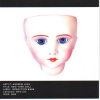 The liner notes read, "This recording is numerologically accurate andanagrammatically active." It's a journey from the recesses of the humanmind to the world of words and sounds; Andrew Liles has resurrected hislove for the anagram and created two discs of inverted uneasinesspractically bathing in the dread and fear of every human psyche.
The liner notes read, "This recording is numerologically accurate andanagrammatically active." It's a journey from the recesses of the humanmind to the world of words and sounds; Andrew Liles has resurrected hislove for the anagram and created two discs of inverted uneasinesspractically bathing in the dread and fear of every human psyche.  It's hard to make a good genre record. The emphasis there is on "good" because it's easy as hell to follow a formula of expected tricks and gags and come out with yet another regurgitation of a genre. Like in the film world, the trick to making a genre record that stands out on its own as a pillar of the genre is an artist behind the work that is willing to jump in head first with a love of the material and an acceptance of the genre's successes and its detritus.
It's hard to make a good genre record. The emphasis there is on "good" because it's easy as hell to follow a formula of expected tricks and gags and come out with yet another regurgitation of a genre. Like in the film world, the trick to making a genre record that stands out on its own as a pillar of the genre is an artist behind the work that is willing to jump in head first with a love of the material and an acceptance of the genre's successes and its detritus. 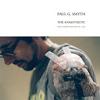 Recorded live in Dublin, The Anaestheticis composed of seven tracks of piano improvisations. The performancewas recorded in a small building dating from the early 18th century andas such, there is no sound-proofing so at certain points in therecording there are sirens heard from the fire station across thestreet and other city noises.
Recorded live in Dublin, The Anaestheticis composed of seven tracks of piano improvisations. The performancewas recorded in a small building dating from the early 18th century andas such, there is no sound-proofing so at certain points in therecording there are sirens heard from the fire station across thestreet and other city noises. Stereo Total's latest album (available in three versions from threecountries: Germay, France and the USA) is a bit of a disappointment.
Stereo Total's latest album (available in three versions from threecountries: Germay, France and the USA) is a bit of a disappointment.  I thought I'd right a wrong here by reviewing Marissa Nadler's debutalbum, which I completely overlooked upon its release last year. Ballads of Living and Dying is unmistakably the same voice and sensibility as that on Mayflower May, but without the conceptual trappings, there are a greater variety of approaches to be found on the record.
I thought I'd right a wrong here by reviewing Marissa Nadler's debutalbum, which I completely overlooked upon its release last year. Ballads of Living and Dying is unmistakably the same voice and sensibility as that on Mayflower May, but without the conceptual trappings, there are a greater variety of approaches to be found on the record.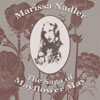
 What was once a side-project of Tarentel bandmates has now fortunately matured into a fully-realized band. The Drift play a moody, contemplative, and sometimes ecstatic mixture of jazz and post-rock which is not too difficult to connect back to the current Tarentel sound, even though there is only one shared member at this point. The ensemble features of an accord of stand-up bass, guitar, drums, and trumpet, all sharing space to make some well-choreographed sounds. The two songs on this exquisitely-packaged 12" are teasers from The Drift's recording sessions for their full-length and the promise exhibited in them is exhilarating. "Streets" is a ten-minute explorative piece which has a few movements to it. It begins with what is literally a drifty oceanic sound shattered eventually by the prodding but not unwelcome entrance of the stand-up bass, poking its plucked strings through the haze. A light percussion gives it some feet until the instruments collaboratively all rush in with a swing-happy trumpet signaling the charge. The pleasantries of the song lie in the ability of all the instruments to be playing singularly and separately, doing their own thing, yet somehow melding into some organic mass of melody and rhythm which keeps the song running, jogging, or sprinting (the song phases through all of these paces amazingly well during its movements). Throughout the song, the instruments seem entirely able to step on one another's toes elegantly, if such a thing were possible. There is no disturbance in the dance, even when one instrument decides to muscle its way in and seemingly ask, "May I cut in?" The bass is the true conveyor for "Streets," while the other instruments step up for flings and flirtations, sometimes brief and other times extended. In the end, the circularity of the song brings it back to its beginnings (in true East Coker fashion) and the drifty sound transports it away on some deliberate ebb tide. "Nozomi" enters with relaxing guitar steps underwritten with a light wails from the trumpet. It's like walking up and down the same three graceful steps over and over. The tempo of "Nozomi" is uniformly slow and meditative, unlike "Streets" where there was acceleration paired with deceleration throughout. In fact, "Nozomi" feels entirely more holistic and showcases the more restrained capabilities of The Drift. They can improvise on a hushed level or an explosive level or on both combined. Likewise, this record can be enjoyed in either a hushed or explosive state, but it's better to embrace both.
What was once a side-project of Tarentel bandmates has now fortunately matured into a fully-realized band. The Drift play a moody, contemplative, and sometimes ecstatic mixture of jazz and post-rock which is not too difficult to connect back to the current Tarentel sound, even though there is only one shared member at this point. The ensemble features of an accord of stand-up bass, guitar, drums, and trumpet, all sharing space to make some well-choreographed sounds. The two songs on this exquisitely-packaged 12" are teasers from The Drift's recording sessions for their full-length and the promise exhibited in them is exhilarating. "Streets" is a ten-minute explorative piece which has a few movements to it. It begins with what is literally a drifty oceanic sound shattered eventually by the prodding but not unwelcome entrance of the stand-up bass, poking its plucked strings through the haze. A light percussion gives it some feet until the instruments collaboratively all rush in with a swing-happy trumpet signaling the charge. The pleasantries of the song lie in the ability of all the instruments to be playing singularly and separately, doing their own thing, yet somehow melding into some organic mass of melody and rhythm which keeps the song running, jogging, or sprinting (the song phases through all of these paces amazingly well during its movements). Throughout the song, the instruments seem entirely able to step on one another's toes elegantly, if such a thing were possible. There is no disturbance in the dance, even when one instrument decides to muscle its way in and seemingly ask, "May I cut in?" The bass is the true conveyor for "Streets," while the other instruments step up for flings and flirtations, sometimes brief and other times extended. In the end, the circularity of the song brings it back to its beginnings (in true East Coker fashion) and the drifty sound transports it away on some deliberate ebb tide. "Nozomi" enters with relaxing guitar steps underwritten with a light wails from the trumpet. It's like walking up and down the same three graceful steps over and over. The tempo of "Nozomi" is uniformly slow and meditative, unlike "Streets" where there was acceleration paired with deceleration throughout. In fact, "Nozomi" feels entirely more holistic and showcases the more restrained capabilities of The Drift. They can improvise on a hushed level or an explosive level or on both combined. Likewise, this record can be enjoyed in either a hushed or explosive state, but it's better to embrace both.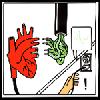 The 15-year-old version of me loves The Mae Shi. The songs on their second release for Kill Rock Stars imprint 5RC carry all the hallmarks of what my inner child holds near and dear: fucked up guitars, anarchic rhythms, singers barely in control of their vocal chords. So I have to trust my more awkward and chubby counterpart when I say that Heartbeeps is a great record. While 2004's Terrorbird was impressive in its ambitious scope (33 songs in 43 minutes) Heartbeeps is just as impressive in its consistency. Songs like "The Meat of the Inquiry" and "Born for a Short Time" charge out of the blocks spitting strangled notes and caustic noise to all in their path at a breakneck pace. It's no surprise then that "Crimes of Infancy" ends in the sound of the band collectively hyperventilating, seemingly exhausted by their efforts. With all the breathlessness, it makes sense that this nearly sixteen minute endeavor is broken up with small slices of keyboard driven synth-pop such as "Spoils of Victory" and "Spoils of Injury." The Mae Shi are best when they stick to the noisy mash-ups. "The Universal Polymath" and "Heartbeeps" end the album with a great one-two punch, stretching out the time constraints and allowing the tempos to slacken without losing any of their thrust. "The Universal Polymath" could be misinterpreted as dance-punk, but its fractured drums, high frequency guitar, and its succinct conclusion challenge all the precepts of that genre while still managing to capitalize on a ferocious groove. Meanwhile, "Heartbeeps" (in its third incarnation on this release) achieves a nervy, anxious mood where hi-hat fills, analog keyboards, and the desperate vocals of the four singers heighten the unease. While Terrorbird was plagued by the fact that it didn't know whether it wanted to move or pummel the listener, Heartbeeps achieves an excellent balance of The Mae Shi's more caustic approach and their desire for a dance party. My 15-year-old self couldn't be happier.
The 15-year-old version of me loves The Mae Shi. The songs on their second release for Kill Rock Stars imprint 5RC carry all the hallmarks of what my inner child holds near and dear: fucked up guitars, anarchic rhythms, singers barely in control of their vocal chords. So I have to trust my more awkward and chubby counterpart when I say that Heartbeeps is a great record. While 2004's Terrorbird was impressive in its ambitious scope (33 songs in 43 minutes) Heartbeeps is just as impressive in its consistency. Songs like "The Meat of the Inquiry" and "Born for a Short Time" charge out of the blocks spitting strangled notes and caustic noise to all in their path at a breakneck pace. It's no surprise then that "Crimes of Infancy" ends in the sound of the band collectively hyperventilating, seemingly exhausted by their efforts. With all the breathlessness, it makes sense that this nearly sixteen minute endeavor is broken up with small slices of keyboard driven synth-pop such as "Spoils of Victory" and "Spoils of Injury." The Mae Shi are best when they stick to the noisy mash-ups. "The Universal Polymath" and "Heartbeeps" end the album with a great one-two punch, stretching out the time constraints and allowing the tempos to slacken without losing any of their thrust. "The Universal Polymath" could be misinterpreted as dance-punk, but its fractured drums, high frequency guitar, and its succinct conclusion challenge all the precepts of that genre while still managing to capitalize on a ferocious groove. Meanwhile, "Heartbeeps" (in its third incarnation on this release) achieves a nervy, anxious mood where hi-hat fills, analog keyboards, and the desperate vocals of the four singers heighten the unease. While Terrorbird was plagued by the fact that it didn't know whether it wanted to move or pummel the listener, Heartbeeps achieves an excellent balance of The Mae Shi's more caustic approach and their desire for a dance party. My 15-year-old self couldn't be happier.
